AMD and Intel have fought for supremacy for decades, duking it out to make the best processors you can buy. The competition is fierce, and that’s a great thing for PC enthusiasts. In 2022, the list of the best CPUs is larger than ever and packed with options from Team Red and Team Blue.
Intel’s flagship Core i9-13900K tops our list, but there are great options regardless of your budget or purpose.
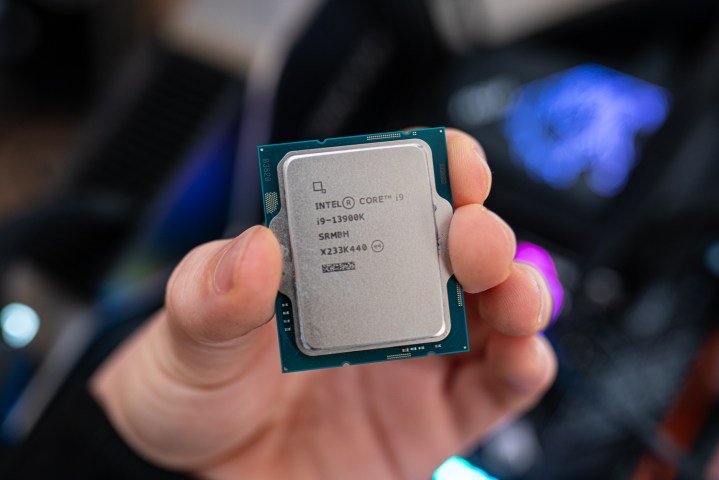
Jacob Roach / Digital Trends
Intel Core i9-13900K
The best processor you can buy
Pros
- Cheaper than AMD competition
- Support for 600-series motherboards and DDR4
- Solid multi-core improvements
- Surprising gen-on-gen improvements
Cons
- High power demands
- Small gaming performance gains
Why you should buy this: It tops performance charts in nearly every benchmark, and it’s cheaper than the competition from AMD.
Who it’s for: Enthusiasts who need high core counts and blistering clock speeds to accelerate video editing, compression, and other demanding tasks.
Why we chose the Intel Core i9-13900K:
The dust launch has settled on the latest generations from AMD and Intel, and it was a much closer battle between the two than we anticipated. Intel came out on top with the Core i9-13900K, though. It doesn’t have a dominating lead in every task, but it comes in around $100 cheaper than AMD’s flagship chip.
Similar to last-generation’s Core i9-12900K, the Core i9-13900K combines performance (P) cores and efficient (E) cores. Core counts are up this time around, though. You’re getting eight P-cores designed on the new Raptor Cove microarchitecture, as well as 16 E-cores using the Gracemont architecture from the previous generation.
Those extra cores help accelerate demanding multithreaded task, which is why the Core i9-13900K managed an 8% lead over the Ryzen 9 7950X in Cinebench R23. The redesigned P-cores also help the Core i9-13900K outpace AMD’s best by 12% in Cinebench’s single core test.
Across nearly all benchmarks, the Core i9-13900K tops the charts, aided in no small part by additional L2 cache and boosted clock speeds. It’s the fastest processor you can buy, but more importantly, it comes in cheaper than AMD’s Ryzen 9 7950X.

Intel Core i9-13900K
The best processor you can buy

Jacob Roach / Digital Trends
AMD Ryzen 9 7950X
The best AMD processor
Pros
- Off the charts CPU performance
- Solid gaming improvements
- Integrated graphics work for light games
- Works with most AM4 coolers
Why you should buy this: It’s insanely fast, and it’s set up to support AMD’s future platforms for many years.
Who it’s for: AMD fans who want the best of the best and don’t mind spending a little extra.
Why we chose the AMD Ryzen 9 7950X:
AMD lost the flagship battle this generation, but only by a thin margin. It’s slightly slower than the Core i9-13900K, and it’s about $100 more expensive. There’s not denying the raw power of the Ryzen 9 7950X, though, nearly matching the Core i9-13900K in most tests.
The processor delivers on its promises, offering a 31% jump in single-core performance and a 36% improvement in multicore performance compared to the previous generation. It takes a slight backseat in some tasks compared to the Core i9-13900K, but only by razor-thin margins. And in some games, like Far Cry 6, the Ryzen 9 7950X is actually a bit faster.
Beyond the processor itself, the Ryzen 9 7950X introduces AMD’s new AM5 platform. It’s expensive to upgrade to now, with high DDR5 memory prices leading that pricing, but AMD says it will support AM5 until at least 2025 (and maybe beyond). That means it should be easy to upgrade to future Ryzen generations without buying a new motherboard.
Although the Ryzen 9 7950X isn’t at the peak of performance, it’s just a step behind. And with features like Smart Access Memory and distant platform support on offer, it’s still a very attractive flagship CPU.

AMD Ryzen 9 7950X
The best AMD processor
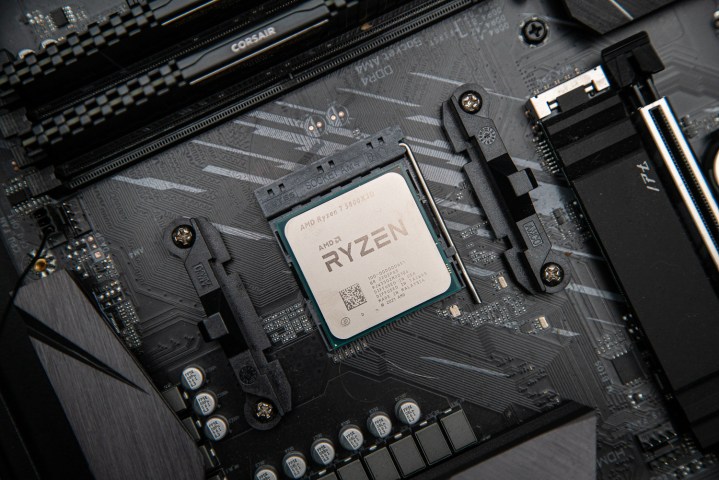
Jacob Roach / Digital Trends
AMD Ryzen 7 5800X3D
The best processor for gaming
Pros
- The fastest gaming CPU on the market
- Solid thermal performance
- Works with AM4 motherboards
- Inexpensive
- Low power requirements
Cons
- No overclocking
- Lackluster general CPU performance
Why you should buy this: It’s still a monster of a gaming CPU, even with next-gen options making the rounds.
Who it’s for: Gamers who don’t need a lot of CPU power for other tasks.
Why we chose the AMD Ryzen 7 5800X3D:
The Ryzen 7 5800X3D might be the first processor ever specifically built for gaming, and it blows everything else out of the water. Why? A curious technology called 3D V-Cache.
For specs, the Ryzen 7 5800X3D is slightly worse than the base Ryzen 7 5800X. It comes with the same eight Zen 3 cores, but the clock speed is 200MHz slower, and you can’t overclock the 3D-stacked part. The difference is that the Ryzen 7 5800X3D comes with an additional 64MB of L3 cache stacked on top of the processor.
It doesn’t sound like a big deal, but extra L3 cache makes a big difference in games. The Ryzen 7 5800X3D beats everything while gaming, including the Core i9-12900KS that costs twice as much.
The Ryzen 7 5800X3D is the best gaming CPU by a long shot, but it takes a backseat in other tasks. If you plan on doing intense video encoding or other productivity tasks, it’s better to go with an AMD or Intel chip with a higher core count. It’s also occasionally outclassed by the newer Ryzen 7 7700X and Intel Core i5-13600K, though it costs less overall.

AMD Ryzen 7 5800X3D
The best processor for gaming
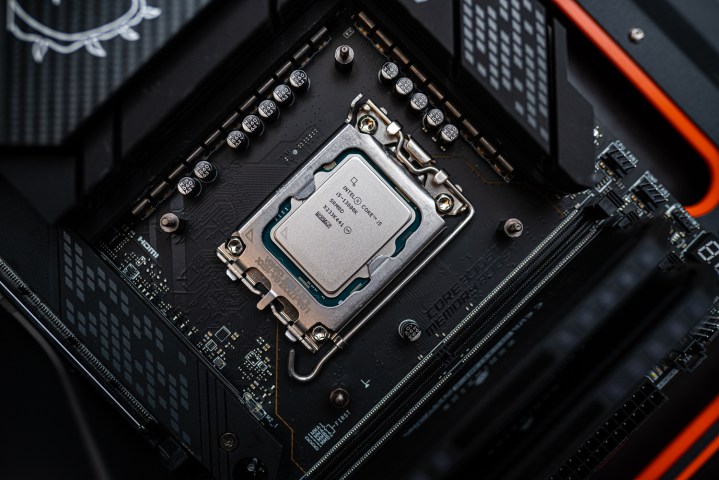
Jacob Roach / Digital Trends
Intel Core i5-13600K
The best value Intel processor
Pros
- Cheaper than AMD competition
- Support for 600-series motherboards and DDR4
- Solid multi-core improvements
- Surprising gen-on-gen improvements
Cons
- High power demands
- Small gaming performance gains
Why you should buy this: It’s a fantastic midrange CPU that punches way above what its price would suggest.
Who it’s for: Mainstream enthusiasts who are willing to sacrifice a little performance in order to save a lot of money.
Why we chose the Intel Core i5-13600K:
The Core i5-13600K is about half the price of the flagship chip this generation, but you wouldn’t know that based on its performance. Packing a total of 14 cores — split between six P-cores and eight E-cores) — and a 5.1GHz boost clock, the Core i5-13600K clobbers the competition and gets close to the performance of last gen’s Core i9-12900K.
More importantly, the Core i5-13600K destroys the Ryzen 5 7600X in most tasks thanks to its higher core count. AMD stuck with six cores for its midrange chip, but Intel focused on pushing core counts up with the Core i5-13600K. Intel’s strategy is a winner based on our testing, speeding up intense tasks like rendering by close to 25% compared to the Ryzen 5 7600X.
It’s a monster in gaming performance, as well. In some games, such as Gears Tactics, the Core i5-13600K is actually faster than AMD’s Ryzen 9 7950X. In most other games, Intel’s chip takes a slight backseat, though it still outpaces the Ryzen 5 7600X by a huge margin.
In addition to the huge performance gains on tap, the Core i5-13600K supports Intel’s LGA1700 socket, as well as DDR4 or DDR5 depending on your motherboard. That makes it a much cheaper upgrade path compared to what AMD is offering, and with higher performance.

Intel Core i5-13600K
The best value Intel processor
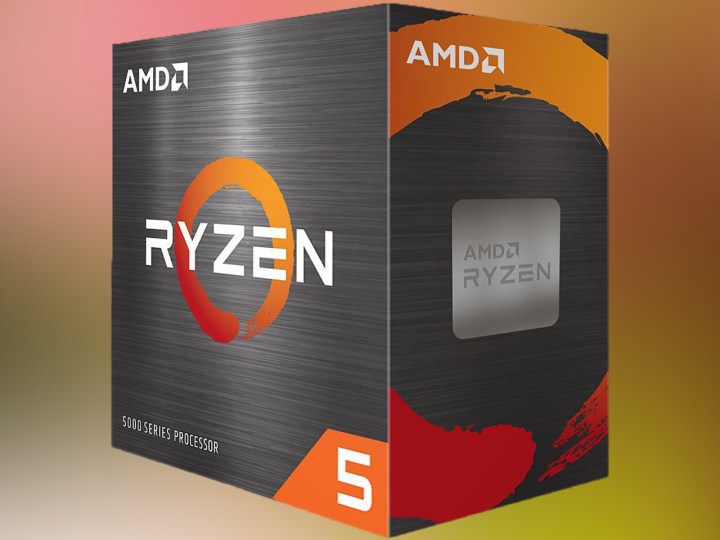
AMD Ryzen 5 5600X
The best value AMD processor
Pros
- Very inexpensive
- Excellent gaming and day-to-day performance
- High boost clock speed
Cons
- Six cores may limit some intense applications
Why you should buy this: It’s dirt cheap now that next-gen options are here, and it still holds up in many tasks.
Who it’s for: Budget gamers looking for a fantastic processor that will hold up for years.
Why we chose the AMD Ryzen 5 5600X:
The Ryzen 5 7600X is here, so why recommend the Ryzen 5 5600X? Although AMD’s latest processors offer the best performance, they’re fairly expensive, considering the cost of DDR5 memory and a new motherboard. The Ryzen 5 5600X is not only cheaper on the platform side, but it’s also about half the price of the next-gen option.
Right now, the Ryzen 5 5600X is somewhere around $160, which is absolutely insane considering the performance it offers. The newer chip offers better gaming performance, but only by a small margin. And the Ryzen 5 7600X doesn’t come with a core advantage, packing in six cores just like the Ryzen 5 5600X.
Considering the price, the Ryzen 5 5600X is a steal. It’s not the best of the best, but it’s by far the best option around $160. There’s nothing from Intel or AMD itself that can get close to the value the Ryzen 5 5600X is offering right now.

AMD Ryzen 5 5600X
The best value AMD processor

Intel
Intel Core i3-12100
The best processor under $150
Pros
- Sells for around $100
- Four performance cores
- Includes a CPU cooler
Why you should buy this: It’s still a competent quad-core processor that’s very inexpensive.
Who it’s for: PC builders on a tight budget who want a solid processor for gaming and work without overspending.
Why we chose the Intel Core i3-12100F:
It’s tough finding CPUs under $150 in 2022, but the Core i3-12100F is a standout. It’s part of the Alder Lake family, and unfortunately, Intel hasn’t released a 13th-gen Raptor Lake chip to replace it. Even with the new CPUs out, though, the Core i3-12100F is a hell of a bargain.
The Core i3-12100F is a quad-core CPU that ranks among the best Intel processors you can buy. It doesn’t come with a hybrid architecture, instead opting for four performance cores, but that doesn’t hurt performance too much.
Gaming is certainly possible, even if it’s a bit behind the six-core Ryzen 5 5600X, and day-to-day use is excellent. This is an entry-level processor, no doubt, but the Core i3-12100F still punches above what its price would suggest.
As we cover in our CPU buying guide, the F suffix on the Core i3-12100 means it doesn’t come with integrated graphics. That saves you some money, but make sure to pair the CPU with one of the best graphics cards to have a usable machine.

Intel Core i3-12100
The best processor under $150

AMD Ryzen 7 5700G
The best processor with integrated graphics
Pros
- Excellent integrated graphics
- Includes a CPU cooler
- Low power draw
Cons
- iGPU isn’t powerful enough for AAA gaming
Why you should buy this: It’s one of the few good APUs that you can buy right now, and it’s relatively cheap.
Who it’s for: PC builders on a tight budget who want a solid processor for gaming and work without overspending.
Why we chose the AMD Ryzen 7 5700G:
Gaming without a GPU is possible, but it’s not an ideal experience. The Ryzen 7 5700G is an exception. It’s a clear winner when it comes to integrated graphics on a CPU, allowing you to hit playable frame rates in popular titles at 1080p.
It will likely stay that way, too. Although Ryzen 7000 is here with integrated RDNA 2 graphics, they aren’t powerful enough for gaming. The Ryzen 7 5700G is an APU with a full graphics engine under the hood.
Although you won’t play the latest AAA games with the integrated GPU, you can still get by. Even better, the Ryzen 7 5700G has eight powerful cores and a 4.6GHz boost clock speed, so you can throw one of the best 1080p graphics cards in your PC and have a gaming monster.
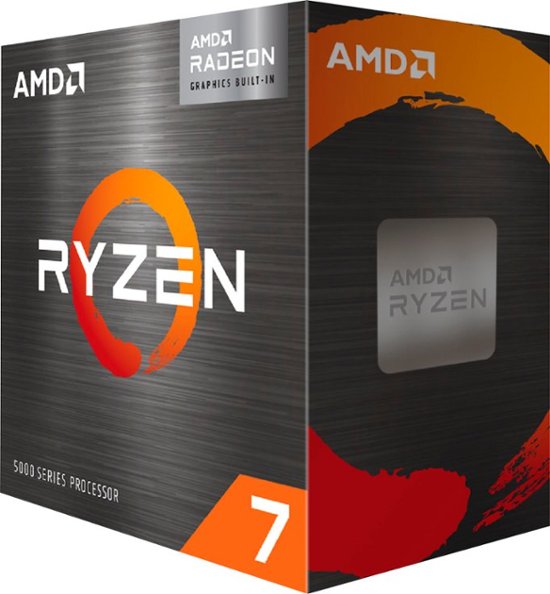
AMD Ryzen 7 5700G
The best processor with integrated graphics
Frequently Asked Questions
Which processor is the fastest?
The fastest processor you can buy right now is the Intel Core i9-12900K. It comes with 24 cores and high clock speeds, allowing it to rip through games and intense productivity applications.
AMD has its Ryzen 9 7950X, which is also very fast. It’s slightly behind in performance, though, and it costs more than Intel’s flagship.
Is i7 better than i5?
Intel Core i7 and Core i5 processors are both excellent options. As the names suggest, i7 processors are faster and more powerful than i5 processors, and they’re more expensive. They may not be the best choice for everyone, though.
For several generations, Intel has segmented six cores to its Core i5 processors and eight cores to its Core i7 processors. The two extra cores provide a performance boost, but they’re not as important if you’re gaming or running basic applications on your PC.
Which type of processor is the best?
AMD and Intel are the main CPU manufacturers, and they tend to leapfrog each other every couple of years. Currently, Intel processors are the best option for raw performance, but AMD processors still provide great performance with much better power efficiency.
Editors’ Recommendations



